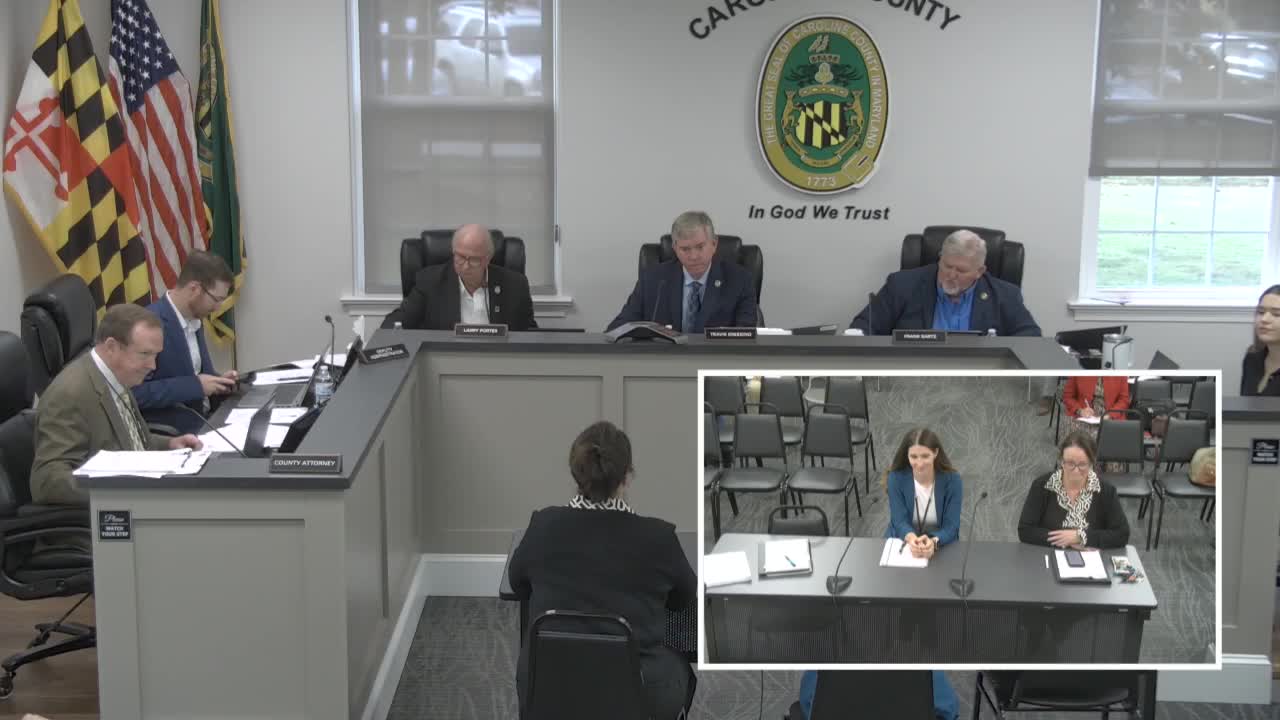Caroline County Health Department outlines behavioral‑health services expansion, mobile integrated health start and prevention programs
Get AI-powered insights, summaries, and transcripts
Subscribe
Summary
Health department leaders briefed commissioners on FY25 behavioral‑health caseloads, school‑based services, mobile integrated health plans with a December pilot start, and prevention work including asthma home visits and a water‑safety campaign.
Robin Cahall, director of the Caroline County Health Department, and Jessica Toole, behavioral health director and local addictions authority, presented the department’s FY25 results and planned programs on Oct. 28 during the commissioners’ Board of Health update.
Toole reported the health department served 1,006 behavioral health clients in FY25 across clinic, mobile and school‑based programs. Highlights included a school‑based mental health effort that served roughly 269 students in five northern county schools, a detention‑center program that served 48 inmates in FY25 and has already served 52 in the first quarter of FY26, and a youth substance‑use mobile treatment van that has served 36 youth since it began visits to middle and high schools.
Measurement‑based care tools have been deployed: Toole said 27 clients responded to a depression outcome score and that more than 84% of survey respondents reported satisfaction with services. The department also reported 155 clients served by its adult mobile treatment unit and roughly 300 clinic‑based behavioral‑health clients.
Cahall and Toole described a soon‑to‑start mobile integrated health (MIH) program in partnership with EMS and Shore Regional Health. The health department has hired a community health nurse (start date Nov. 12) to work with EMS referrals; the program expects to accept initial clients Dec. 1 and will limit the first phase to EMS referrals of frequent utilizers. A Shore Regional Health pharmacist (PharmD) is expected to join the team in January 2026 to provide telepharmacy and medication‑review services for discharged patients; the department said medication mismanagement is a key cause of readmissions and ambulance transports.
Prevention and population‑health programs were also discussed. The department plans to partner with Dorchester County on a home asthma visiting program, aims to expand diabetes prevention programming in partnership with community organizations and Eastern Shore AHEC, and will run a water‑safety public campaign using the National Drowning Prevention Alliance toolkit from May–August 2026. The department reported a firearms‑safe‑storage initiative funded last year with $22,000 to distribute 200 small firearm safes and information countywide; 136 safes were reported distributed by June 30, 2025.
Budget, staffing and grant notes: Cahall reported a staff of 112 with two open positions, a slight core‑funding increase in the FY26 county match to cover COLAs and salary adjustments, and expected grant declines of about $860,000 tied to grant expirations. Cahall said the department has improved its billing/credentialing capacity to accept private insurance and aims to align some priorities with the Maryland State Health Improvement Plan (chronic disease, asthma among children was selected locally for 2026 efforts).
Why this matters: The health department’s MIH pilot and the expanded school and detention services are intended to reduce ambulance transports, emergency visits and readmissions by bringing care to patients and supporting transitions from hospital to home.
Ending: Cahall and Toole said the MIH pilot will start small, will be coordinated with EMS and Shore Regional Health, and will expand if initial outcomes support scaling to wider referral sources.
